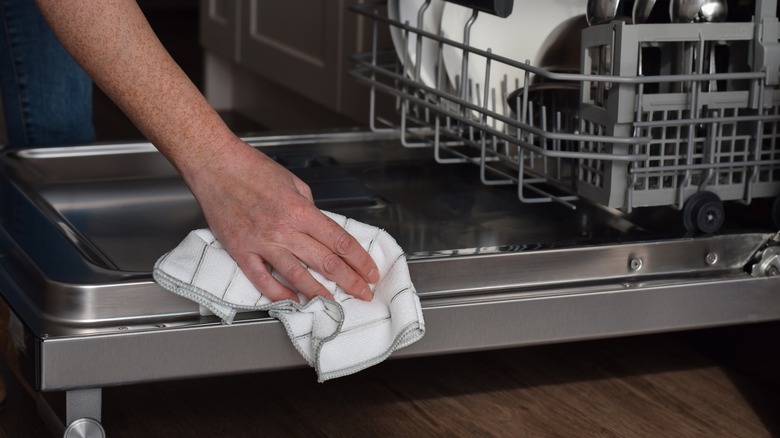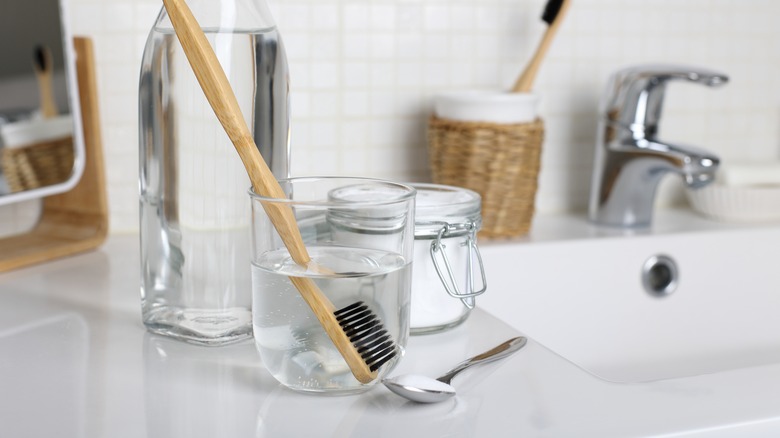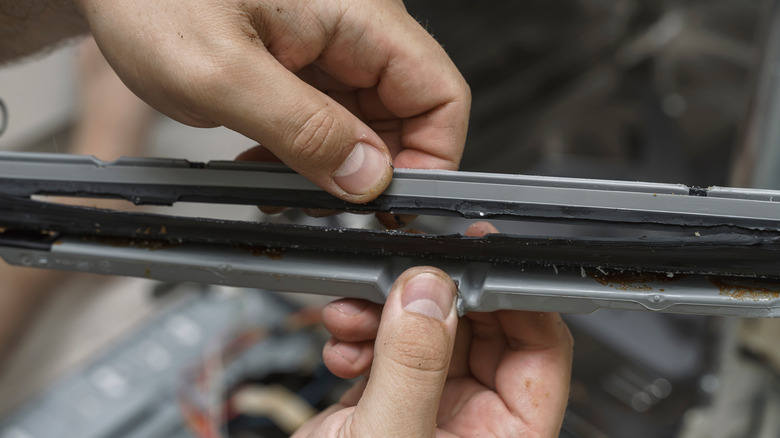The Simple Way To Clean Your Dishwasher And Fridge Gaskets
Keeping your kitchen clean is an important part of preventing bacteria buildup. A quick wipe down after cooking will help to quickly sanitize your cooking surfaces, but you'll also want to do deeper cleans regularly to ensure your entire kitchen is clean. It can be easy to forget about cleaning things you don't often interact with — like gaskets.
Both your refrigerator and dishwasher have gaskets, and they serve similar purposes. A dishwasher gasket helps to create a barrier, keeping water inside during the washing cycle. Instead of water, your fridge gasket will keep cold air in, which helps to keep your food fresh and safe to eat.
While these may be often overlooked, you can create one simple solution to keep the two different areas clean. You'll just need to mix some water with a little bit of vinegar or bleach. Then, you can simply wipe down the gaskets with a soft microfiber cloth while cleaning the inside of your dishwasher door or refrigerator.
How to mix the cleaning solution
Whether you choose to use vinegar or bleach, you'll want to make sure you're mixing an equal amount of one with water. Both bleach and vinegar can damage rubber when directly exposed, but diluting them with water can prevent the gaskets from failing.
While bleach will keep things clean and sanitized, too much of the chemical could damage the rubber and cause it to become brittle. Eventually, the gasket could crack and break the seal. Diluting the bleach with water can help prevent premature breakdown while still keeping things clean.
There are plenty of different types of vinegar, but you'll want to use white distilled for cleaning. Vinegar will be a little gentler on the rubber, depending on what type of rubber the gasket is made out of. The acidity of the liquid could also cause damage if too much is applied, so dilution with water is essential.
Of course, you should always check the manual for your machine to determine the best cleaning method. Some appliances recommend water only as a cleaner for gaskets. You can also adjust the ratio of the mixture to use more water than bleach or vinegar. Whatever you choose to use, be sure to wipe the entire gasket clean with the microfiber cloth dipped in the solution to get rid of any bacteria or dirt buildup.
Prolong the life of the gaskets with a little oil
If your gasket needs a little extra scrubbing, you can swap the microfiber cloth out in favor of an old toothbrush. Just be sure to use one that has soft bristles. Once you've finished cleaning the gasket, dry it off with a fresh microfiber cloth or a piece of paper towel. You should clean your gaskets once a month or so to ensure that they stay clean and working properly.
If you fear your gasket is beginning to dry out, you can use a little bit of oil to prolong its lifespan. Lemon or mineral oil should be kept in the kitchen since it can be beneficial for plenty of uses, but it will also work for this. The oil should only be added to the rubber every few months; overdoing it could actually cause the gasket to break down and leak water or cold air out.
With regular cleaning, the gaskets should stay in good condition. You should be inspecting the seal at least once a year, though, to ensure that they're still functioning properly. And gaskets that are cracked, torn, or misshapen should be replaced immediately.


